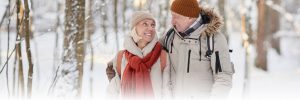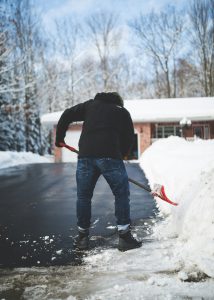
Have you ever heard the phrase “old man winter?” Those of us living in Ohio certainly know that phrase! It’s that time of year where the cold weather is beginning to roll in and we all have to prepare for the changes that come with it.
It’s Important to Keep Warm
People simply don’t like cold, snowy weather, but they are accustomed to feeling cold during the winter months. Did you know older adults can lose body heat faster? This can become a major health concern if it leads to developing hypothermia. Hypothermia happens when the body temperature reaches 95°F or lower. Being outside in the cold, or being in a very cold house, can lead to hypothermia.
Here are some tips to help prevent hypothermia and stay warm:
- Set the heat in your home to at least 68–70°F. Even mildly cool homes with temperatures from 60 to 65°F can lead to hypothermia in older adults.
- Make sure the house isn’t losing heat through windows. Keep the blinds and curtains closed.
- Use draft stoppers or towels under windows and doors to prevent cold air from seeping in.
- Dress warmly on cold days even if staying in the house. Wear layers of clothing as well as warm socks and slippers.
- Use blankets and throws to keep warm.
- Drink warm liquids like tea or hot cocoa.
- Make sure to eat enough food to maintain an appropriate weight. This can cause an inability to stay warm. Eat hot meals and snacks throughout the day.
- Drink alcohol moderately, if at all. Alcoholic drinks can cause the loss of body heat.
- Stay active and move around to generate body heat.
Home Safety
During the winter months, ice, snow, and cold temperatures can lead to safety issues for older adults. Here are some safety tips to consider this winter:
some safety tips to consider this winter:
Avoid slipping on ice: Icy or snowy roads and sidewalks make it easy to fall. Some falls may cause injuries such as hip and wrist fractures, head trauma, and other injuries.
When entering your home, make sure you:
- Dry the wheels or tips of your walking aid before entering your home.
- Keep your entryway clear of clutter to avoid slipping or tripping. Use an ice melt product to clear outside walkways.
- Keep a small table or shelf near the entry door to put items while unlocking the door.
- Use a different entrance if your home’s main entrance is often icy.
- Stay inside when the weather is bad. Consider delivery services for prescriptions, groceries and other necessities.
When outside your home, make sure you:
- Avoid shoveling snow yourself when possible.
- Use railings to help avoid slipping on icy stairs and walkways.
- Wear nonskid, rubber-soled, low-heeled footwear.
- Ensure outdoor areas are well lit.
Stay Safe on the Roads
Driving during the winter months can be hazardous for those who may not drive as often. Checking the oil, tires, battery, and wipers can make a big difference on winter roads.
Also make sure you have your roadside assistance plan up to date in case of emergencies. Stock your car with basic emergency supplies such as:
- First aid kit
- Blankets
- Extra warm clothes
- Booster cables
- Windshield scraper
- Rock salt or a bag of sand or cat litter (in case your wheels get stuck)
- Water and dried or canned food
- Flashlight
Prepare for Winter Storms
Winter storms can lead to power outages. Make sure you have easy access to flashlights and a battery-powered radio in case the power goes out. Keep a supply of warm blankets handy.
Here are some things to consider during a power outage.
- Generator safety. If you use a generator during a power outage, be mindful of the risks. Know how to stay safe and NEVER use a generator inside your home.
- Stay informed. Follow a local station on a battery-powered radio for updated emergency information.
- Preserve heat. Close blinds or curtains as well as unused rooms and
- Stay warm. Layers of loose-fitting, lightweight, warm clothing will keep you warm.
- Eat regularly. Food provides the body with energy for producing its own heat. Drink liquids such as broth or juice. Avoid caffeine and alcohol.
Eat Well and Stay Hydrated
People spend more time indoors and may eat a smaller variety of foods, causing nutritional deficits, especially a vitamin D deficiency. It is recommended that older adults consume foods that are fortified with Vitamin D, such as milk, grains, and seafood options like tuna and salmon.
a vitamin D deficiency. It is recommended that older adults consume foods that are fortified with Vitamin D, such as milk, grains, and seafood options like tuna and salmon.
Many people believe that dehydration is only a concern during the summer months. A variety of winter factors can cause moisture to leave our bodies quickly, leading to dehydration. Also consider health conditions or medications that could increase your risk of dehydration – like blood pressure medications that flush water from the body. Stay hydrated by drinking water throughout the day.
Move Before Snow Falls
The cold, icy winter weather ahead might have you considering making the move to a senior living community. Offering maintenance free living, you can avoid shoveling snow and cleaning the ice off your car this winter! In addition, senior living communities can provide older adults with services and assistance with activities of daily living, as well as social opportunities. Many senior living communities offer regular activities for residents at all care levels.
If you are considering moving to a senior living community, consider taking a tour of one of The Ohio Masonic Communities campuses. With three senior living communities across Ohio – Browning Masonic Community in Waterville, Ohio, Springfield Masonic Community in Springfield, Ohio, and Western Reserve Masonic Community in Medina, Ohio – each offers premier living options with exceptional experiences so older adults can live their best lives. If you are interested in learning more about one of our communities, give us a call at 1-877-881-1623 or schedule a visit.